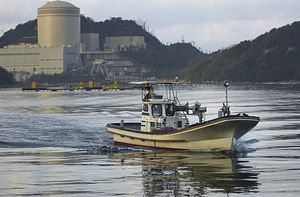There has been quite a bit of movement on the nuclear front in Japan over the course of this week, as the government is making plans to better accommodate the clean-up efforts at the stricken Fukushima Daiichi Nuclear Power Plant, as well as decommission certain reactors that are nearing the 40-year age limit imposed by stringent new industry guidelines. The relevant members of Prime Minister Abe’s new Cabinet are also weighing in on the issue, as they seek to both ease concerns about the future of Japan’s nuclear industry while making it possible to bring some of the country’s 48 idled reactors back online.
The Nikkei reported Friday that the government has plans to require the country’s utility companies to make plans to decommission at least 12 of Japan’s reactors, as they are either too expensive to upgrade or too old to meet the Nuclear Regulatory Authority’s new, much tougher requirements. According to the report, “The government is betting that by forcing older units considered more vulnerable to disaster to shut down it may gain public support to restart newer units.” In addition, decommissioning older reactors is likely to be substantially cheaper than paying for the necessary upgrades.
Kansai Electric Power Co. may be the first utility to follow the government’s new plan. It is considering decommissioning its two Mihama reactors in Fukui prefecture, which were built in 1970 and 1972. In addition to being older than the government’s 40 year age limit, the reactors are small, with the No. 1 reactor providing 340 megawatts and the No. 2 reactor 500 megawatts. The cost of decommissioning to Kansai Electric would be roughly 30 billion yen ($283 million), while paying to upgrade the facility and bring it back up to code could end up costing several hundred billion yen.
From the Cabinet, the new Environment Minister Yoshio Mochizuki said the government is “speeding up efforts” to reduce the impact of radiation from Fukushima. Last Saturday the governor of Fukushima prefecture, Yukei Sato officially approved the government’s plan to build interim storage facilities for soil and other waste from the stricken reactor, according to the Jiji Press. He made the decision after consulting with the Mayors of Okuma and Futaba, where the storage facilities will likely be built. After reaching his decision, Yuhei said he would not seek reelection on October 26, with Japan Today reporting that “Sato has been under tremendous pressure from the central government for many months to accept the plan and told a news conference earlier this week that it was an agonizing decision.” According to the Japan Times, the waste from the Daiichi could be transported as early as this January, although industry professionals remain skeptical of the timetable. Mochizuki said “I know the road ahead is rough, but the ministry is determined to follow through on our current plan. We shouldn’t let our uncertainty affect our determination, at least for now.” He also has plans to continue implementing the previous Cabinet’s goal of making renewable energy 30 percent of the country’s overall energy mix by 2030.
The new Economy, Trade and Industry Minister Yuko Obuchi said on Thursday that the government is also planning to announce new sites soon for the final storage of the country’s nuclear waste from its 48 reactors. Japan currently has 17,000 tons of spent nuclear fuel, with Obuchi saying that “it is the responsibility of the current generation to solve the issue of final disposal,” according to a separate Jiji Press article. She also echoed Mochizuki’s commitment to increasing renewable energy in the country’s overall energy mix, noting that “Although no concrete figure is available at this stage, the government will set a goal as soon as possible.”
Finally, First Lady Akie Abe also weighed in on Japan’s nuclear situation in an interview with Reuters on Thursday. Often described as the “household opposition” for publicly discussing opinions counter to her husband, she said she did not believe Japan should restart its nuclear reactors. “Once an accident occurs, it is a terrible thing that cannot be undone,” she said. “If there are alternative sources of energy, I would like them to stop (nuclear power). I’d like them not to restart off-line reactors.” However, she said she had not “made this point forcefully” to the prime minister as it is still a delicate public issue. Prime Minister Shinzo Abe has stated that his energy policy includes the return of at least part of Japan’s nuclear industry as a vital component of overall energy security.

































